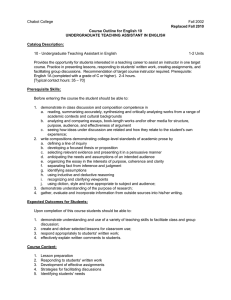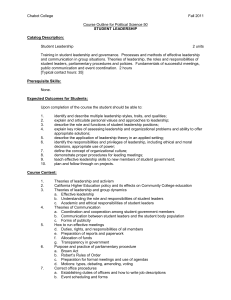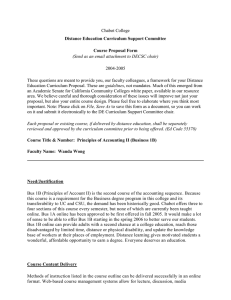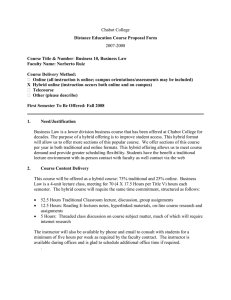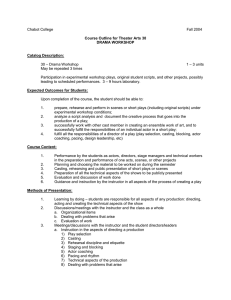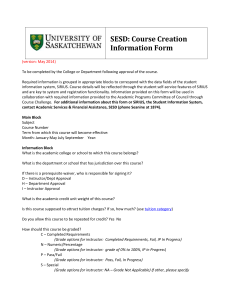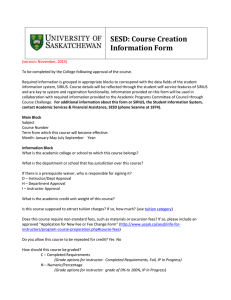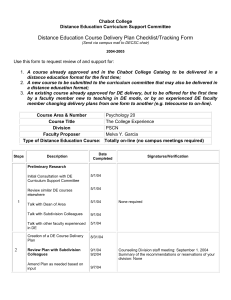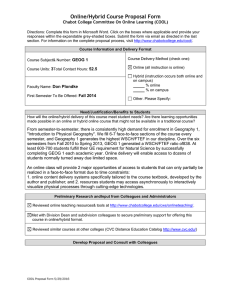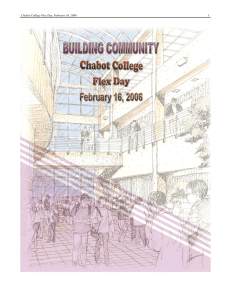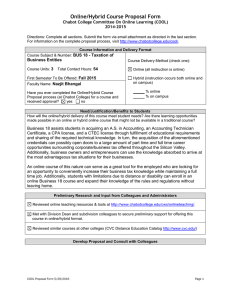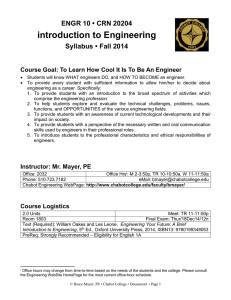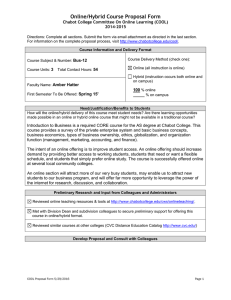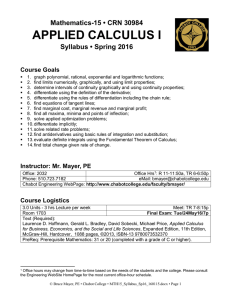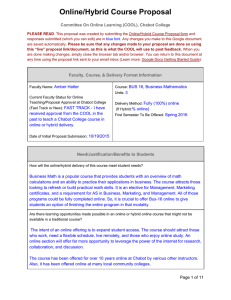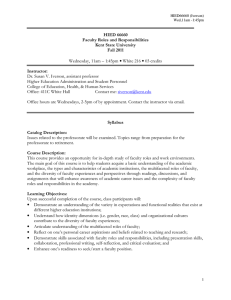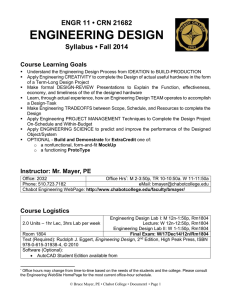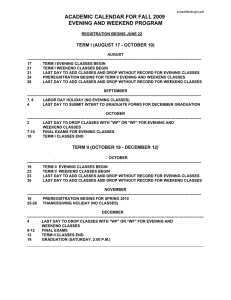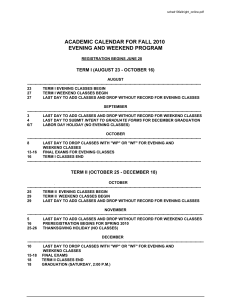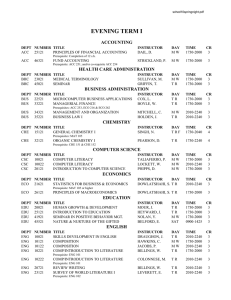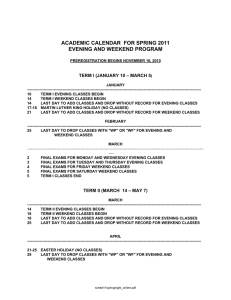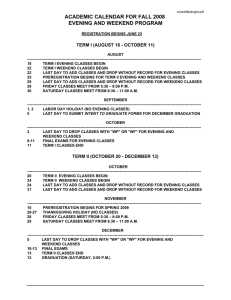Document 11547739
advertisement
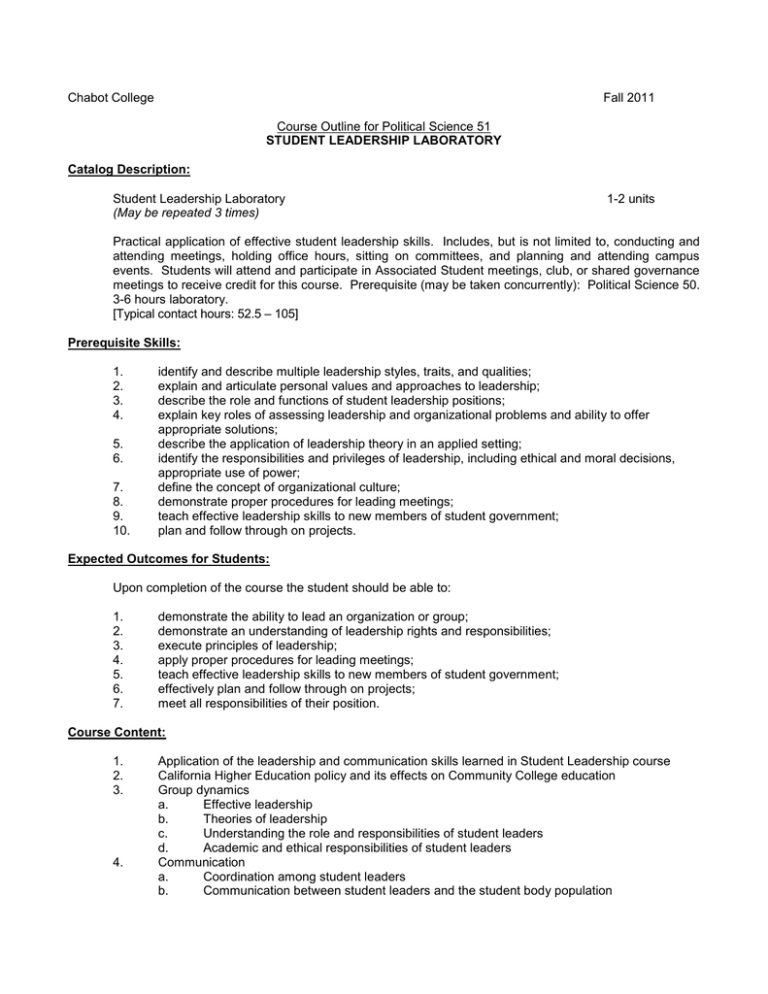
Chabot College Fall 2011 Course Outline for Political Science 51 STUDENT LEADERSHIP LABORATORY Catalog Description: Student Leadership Laboratory (May be repeated 3 times) 1-2 units Practical application of effective student leadership skills. Includes, but is not limited to, conducting and attending meetings, holding office hours, sitting on committees, and planning and attending campus events. Students will attend and participate in Associated Student meetings, club, or shared governance meetings to receive credit for this course. Prerequisite (may be taken concurrently): Political Science 50. 3-6 hours laboratory. [Typical contact hours: 52.5 – 105] Prerequisite Skills: 1. 2. 3. 4. 5. 6. 7. 8. 9. 10. identify and describe multiple leadership styles, traits, and qualities; explain and articulate personal values and approaches to leadership; describe the role and functions of student leadership positions; explain key roles of assessing leadership and organizational problems and ability to offer appropriate solutions; describe the application of leadership theory in an applied setting; identify the responsibilities and privileges of leadership, including ethical and moral decisions, appropriate use of power; define the concept of organizational culture; demonstrate proper procedures for leading meetings; teach effective leadership skills to new members of student government; plan and follow through on projects. Expected Outcomes for Students: Upon completion of the course the student should be able to: 1. 2. 3. 4. 5. 6. 7. demonstrate the ability to lead an organization or group; demonstrate an understanding of leadership rights and responsibilities; execute principles of leadership; apply proper procedures for leading meetings; teach effective leadership skills to new members of student government; effectively plan and follow through on projects; meet all responsibilities of their position. Course Content: 1. 2. 3. 4. Application of the leadership and communication skills learned in Student Leadership course California Higher Education policy and its effects on Community College education Group dynamics a. Effective leadership b. Theories of leadership c. Understanding the role and responsibilities of student leaders d. Academic and ethical responsibilities of student leaders Communication a. Coordination among student leaders b. Communication between student leaders and the student body population Chabot College Course Outline for Political Science 51, Page 2 Fall 2011 5. 6. 7. c. Publicity of campus events Effective meetings a. Duties, rights, and responsibilities of various leadership positions b. Preparation of reports and paperwork c. Allocation of funds d. Transparency in government Parliamentary procedure a. Appropriate use of Robert’s Rules of Order b. Preparation and distribution of agendas c. Use of motions: types, debating, amending, voting Office Procedures (if applicable) a. Duties of officers and job descriptions b. Office Hours c. Event scheduling and complete forms Methods of Presentation: 1. Democratic decision-making processes 2. Class discussion 3. Individual and group conferences with instructor 4. Instructor observation and follow up with students 5. Coached supervision of necessary aspects of jobs Assignments and Methods of Evaluating Student Progress: 1. Typical Assignments: a. Hold specified office hours (if applicable). b. Develop, plan and execute events such as Club day. c. Complete required forms. d. Attend required meetings and accurately reporting hours and completion of role-specific responsibilities on course forms. 2. Methods of Evaluating Student Progress: a. Job requirements and hours must be logged on appropriate forms and submitted on a biweekly basis b. Weekly meetings with instructor c. Instructor observation and feedback d. Oral presentations (individual and group) on projects e. Final Examination or project Textbook(s) (Typical): The Student Government Leadership Challenge (1st edition), James M. Kouzes and Barry Z. Posner, Jossey-Bass, 2008. The Student Leadership Guide (4th edition), Brendan Burchard, Morgan James Publishing, 2008. Emotionally Intelligent Leadership: A Guide for College Students, Scott J. Allen and Marcy L. Shankman, Jossey-Bass, 2008. Robert’s Rules of Order, Henry M. Robert, General Books, LLC, 2010. Special Student Materials: None. POSC 51, 9/10, cs
